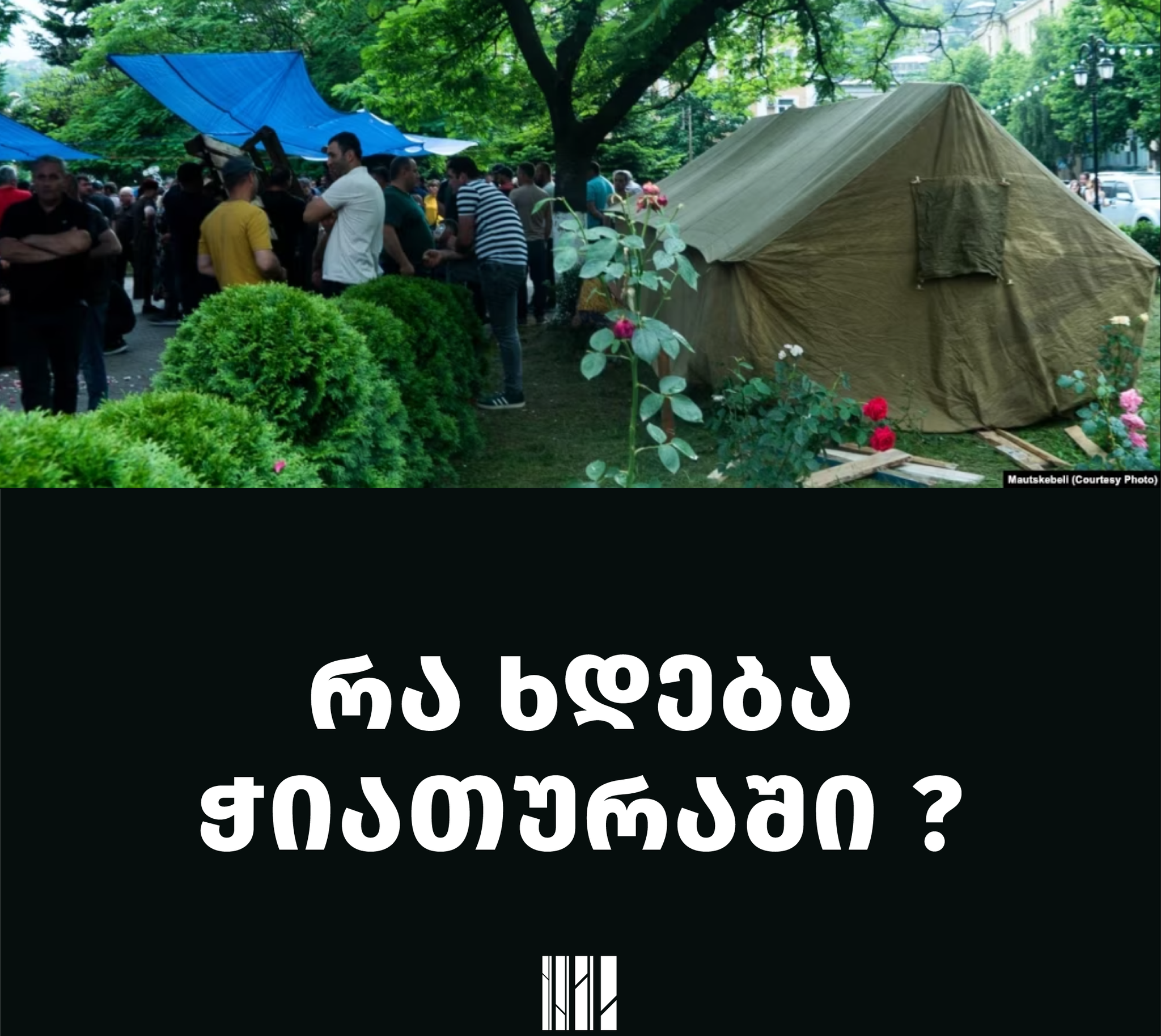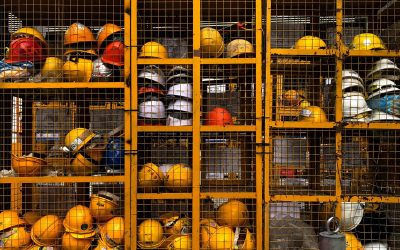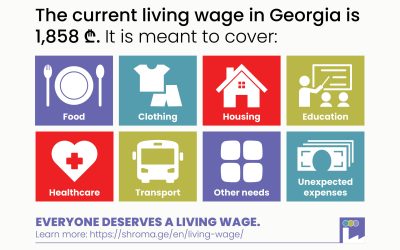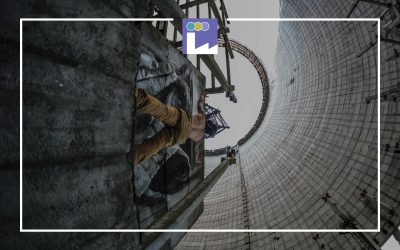Miners in Chiatura have entered their 10th day of protest and 4th day of a hunger strike. They are demanding an improvement of their harsh working conditions, marching through the city’s streets with their family members.
Miners’ demands center on their work schedule, plan and pay; labor safety; paid leave, sick leave and insurance; dormitory and food quality; resumption of work and back pay. More details on what the miners are asking for and why their demands are fair can be found in this document prepared by the Social Justice Center, a member organization of the Fair Labor Platform:
1. Work schedule, plan and pay
Among the 14 requests submitted by the miners to the mediator, the second is “the return of the existing schedule/plan until February 01, 2023”. That was the date that Georgian Manganese moved to “temporary work mode.” This regime, which was supposed to end in May, meant that mines and factories would be shut down and workers would receive only 60% of their wages. The company says it made that decision because of a crisis in the ferroalloys market and the resulting drop in the price of the company’s products. Management informed labor unions and public agencies[1] of their decision in a letter dated January 18.
Since the company paid only 60% of the salary to the employees from February 1, the miners faced the problem of meeting their financial obligations, particularly the payment of loans. According to the workers, the company reached an agreement with four banks operating in Chiatura, which suspended their obligation to repay loan principal during the temporary work stoppage. However, according to employees, additional interest continued to pile up, raising the total cost of their loans. Thus, due to the “temporary work regime” unilaterally introduced by the company, the miners suffered financial injury. That’s why the 3rd demand put forward by the miners is “to suspend and postpone the payment of loan interest in all banks (and to eliminate what has been charged so far).”
On May 4, the trade union of the Chiatura workers (hereinafter, the “union”) published a statement announcing that the “temporary work regime” would end from the month of May, and all nine shifts operating in Chiatura would resume operations. But only some of the shifts resumed in May. In June, the company made a promise that it would be able to restore all shifts and mines only if the employees agreed to a new work schedule, plan and pay scheme it proposed.
What the new terms proposed by the company mean and how it will worsen miners’ pay and security
According to Georgian Manganese, the company employs a total of 3,382 people, with 730 of them working on a shift basis in the mines[2]
Shift workers say that in 2022, before the introduction of the “temporary work regime”, they worked seven consecutive days with a 12-hour schedule and rested for the next seven days. As a result, on average, they worked for half a month and rested for the other half. This schedule gave them the opportunity to take other temporary jobs on their days off, which many workers relied on financially.
The new schedule proposed by the company involves a transition to 8-hour workdays, with three shifts per day. This means employees will have to work more days during the month.
In addition, according to the company’s instructions, shift workers should work with the new workplan. Until now, the workplan was based on the amount of ore extracted, “tonnage”. The new plan proposed by the company would be based on “traveled distance” in the mine. In other words, the company will set employees the distance (in meters) that miners have to move forward during their shift. The miners unanimously say that the new plan proposed by the company is unrealistic, and that they cannot fulfill it without gross disregard for health and labor safety norms. It is worth noting that this criticism has been made both mine employees and their supervisors.
In addition to the change in the work schedule and plan, the company also wants to change the remuneration scheme. Employees who worked on the “tonnage” system say that could earn bonuses if they exceeded their targets.
But one of variation of the new scheme proposed by the company involves dividing salaries into several components. There would be a fixed salary of 80% of the “tariff”[4], plus 15% if the workplan is fulfilled and 5% for good “discipline.” Given that employees say the new workplans would be impossible to fulfill, this essentially amounts to a 15% pay cut. Depending on the details of the workplan, they also lose the chance of getting bonuses based on tonnage, as they did previously.[5]
According to the Labor Code of Georgia, the working time/schedule is an essential condition of the labor contract. It cannot be changed without the consent of the employees.
The miners are simply demanding that their work conditions remain as stated in the collective labor agreement they signed with Georgian Manganese. The company’s decision to change the schedule and pay unilaterally, without the consent of the miners, is a gross violation of Georgian law.[6]
2. Labor safety
Among the miners’ demands are “supervised security” and “upgrading/improving/replacing equipment”. They speak of complete disregard for labor safety norms and systemic safety failures by the company. In particular, the miners say they do not have the appropriate equipment and protective clothing.
The list of other safety complains is long and detailed: the flashlights that the company provides for them are of poor quality; most of the facilities do not have electric saws, so when finding wood on the ruins, the miners have to use a mechanical saw, which takes much longer; those working with drills do not have anti-vibration gloves and complain of long-term negative effects of repeatedly using of the drill; overalls are generally not adapted to the individual functions of the employees; workers have to move heavy equipment by hand (120-130 kg items – for two people); in some mines, there are deep pools of standing water and their water pumps are of poor quality; mining pressure levels are not controlled in mines; tractors are broken and emit emissions, and the water system that is supposed to reduce emissions is broken; dust concentrations are not measured after the explosions; the ventilation system is faulty; and safe distances from explosions are not established by policy.
According to the miners, the fact that they must often enter previously worked tunnels for the second or third time creates a special danger because tunnel stability decreases when it is worked several times. Proper reinforcement of the ceilings and walls of such tunnels is lacking.
Against this background, the company has proposed imposing an even more unrealistic and demanding workplan, which miners say is fundamentally unsafe. According to Radio Liberty, the Labor Inspectorate last inspected the company in 2018 and found more than one violation. The inspection report notes that the company did not identify the hazards in the workplace and assess the risks arising from them. In 2019, the company was fined during a re-inspection for not correcting the violations. On June 12, 2023, at a meeting with the miners, the representatives of the inspection said that Georgian Manganese appealed this fine in court.
3. Paid leave, sick leave and insurance
Among the miners’ demands are the use of the right to vacation, 100% compensation for sick leave and an improvement in their insurance conditions.
According to the miners, they are not allowed to use paid leave, as provided by the Labor Code.[7] Nor are they compensated 100% of their salary during temporary incapacity for work due to illness, as required by law. [8]
In addition, the health insurance policy offered by the company is inadequate. For example, miners indicate that the insurance company usually does not reimburse expensive drugs; the number of provider clinics is limited; in case of receiving services in a non-provider medical institution, reimbursement is less than the actual cost.
4. Dormitory and food quality
The miners also demand that they be allowed to use the company dormitory, as was the case before February 1. According to the workers, before the introduction of the temporary work regime, there was shared accommodation for miners near the mines. They say that this accommodation was especially convenient for employees from other municipalities who stayed there during the working week. As of this year, this residence no longer serves miners. The miners also state that the residence served relatively balanced meals, which made the dry ration they received during their work shift bearable.
Another demand of the employees concerns the improvement of the dry ration, which became particularly urgent after the cancellation of dormitory access. Miners complain about the scarcity of company-supplied rations (i.e., dry rations are given only once per 12- or 8-hour shift), as well as their poor quality.
5. Manganese open pit mining and its impacts
In addition, the protesting miners are demanding solutions to the serious environmental problems caused by the mines in Chiatura and surrounding areas. More precisely, the workers want Georgian Manganese to comply with environmental regulations and take into account the interests of the local population.
Much of the damage is caused by open pit mining conducted by so-called “cooperatives” – independent groups of miners who have an agreement to sell their ore to Georgian Manganese (which holds the general mining license).
Open-pit mining requires the excavation of huge areas and causes severe damage to the environment. Environmentalists refer to the situation created in the villages of Chiatura as an ecological disaster. The cooperatives that extract the ore do not repair or recultivate the areas they mine, which means the villages of Chiatura are full of huge pits and hills. These pose a direct physical danger to the residents there. In addition, uncontrolled manganese mining pollutes soil, water, and air alike.[9] In 2017, according to government calculations,[10] environmental damage caused by Georgian Manganese amounted to 416 million GEL (USD 159.7 million)
6. Resumption of work and back pay
The workers demand the opportunity to resume work as soon as possible, and to be given back pay for the period during which work was suspended.
As noted above, the miners’ protest was caused by the company’s illegal decision to unilaterally change their salary and schedule. The Labor Code of Georgia unequivocally establishes that any work absence caused by the employer must be compensated by the employer.[11]
On April 12, the Minister of Health appointed a mediator to resolve the labor dispute, who has already met with the employees and the company. Our organization will closely monitor the progress of the mediation process and, in general, the development of events in Chiatura in the coming days. We call on the government, which has been overseeing Georgian Manganese since 2017 with the help of a special manager, to ensure the full satisfaction of the miners’ demands as quickly as possible.
Footnotes and bibliography
[1] The company’s letter was addressed to the Ministry of Labor, Health and Social Protections, the Ministry of Environmental Protection and Agriculture, the Ministry of Economy and Sustainable Development and the City Hall of Chiaturi Municipality.
[2] The figure of 3,382 people presumably includes those employed in administrative positions.
[3] According to the miners, a “time trial” conducted under the supervision of the company itself, during which the time and volume of work were precisely described and recorded, shows that the company’s plan is unrealistic.
[4] Miners refer to the pay per shift as a “tariff”.
[5] That is why the company’s claim that salaries “remain unchanged for the month,” is false and manipulative.
[6] The company exploits the local population’s financial dependence on the company and indicates in its statement that if the employees do not agree to its conditions, it will not be able to restore the work process. According to the company, “the only solution to maintain operations with current funding and credit obligations is to modify working conditions. Otherwise, the company will not be able to restore temporarily stopped production facilities.”
[7] See, Labor Code of Georgia, Article 31.
[8] See, “Rules for appointing and providing aid due to temporary incapacity”, Article 6.3, approved by the order #№87/N of the Minister of Labor, Health and Social Protection of Georgia dated February 20, 2009.
[9] See, for example, Green Alternative, Field Report, Chiatura, 2018, available at: https://greenalt.org/app/uploads/2021/05/fieldtrip_report_chiatura_2018.pdf.
[10] See, Decision of the Board of Administrative Affairs of the City Court of Georgia on the appointment of a special manager, May 11, 2017.
[11] See Labor Code of Georgia, Article 42.1.



